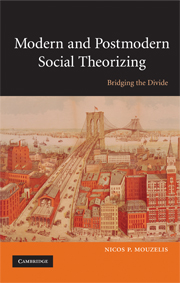Book contents
- Frontmatter
- Contents
- List of figures
- Acknowledgements
- Introduction
- Part I The theoretical background: the development of the agency–structure problematic
- Part II Parsonian and post-Parsonian developments
- 2 Parsons and the development of individual rights
- 3 Evolution and democracy: Parsons and the collapse of communism
- 4 Post-Parsonian theory I: neo-functionalism and beyond
- 5 Post-Parsonian theory II: beyond the normative and the utilitarian
- Part III Agency and structure: reworking some basic conceptual tools
- Part IV Bridges between modern and late/postmodern theorizing
- Part V Towards a non-essentialist holism
- Instead of Conclusion: Twelve rules for the construction of an open-ended holistic paradigm
- Appendix: In defence of ‘grand’ historical sociology
- References
- Index
2 - Parsons and the development of individual rights
Published online by Cambridge University Press: 05 June 2012
- Frontmatter
- Contents
- List of figures
- Acknowledgements
- Introduction
- Part I The theoretical background: the development of the agency–structure problematic
- Part II Parsonian and post-Parsonian developments
- 2 Parsons and the development of individual rights
- 3 Evolution and democracy: Parsons and the collapse of communism
- 4 Post-Parsonian theory I: neo-functionalism and beyond
- 5 Post-Parsonian theory II: beyond the normative and the utilitarian
- Part III Agency and structure: reworking some basic conceptual tools
- Part IV Bridges between modern and late/postmodern theorizing
- Part V Towards a non-essentialist holism
- Instead of Conclusion: Twelve rules for the construction of an open-ended holistic paradigm
- Appendix: In defence of ‘grand’ historical sociology
- References
- Index
Summary
In dealing with the issues of rights and citizenship in modern societies, Parsons was very much influenced by T. H. Marshall's account of the successive development of civil, political and social rights in the United Kingdom. Given this, it is appropriate briefly to examine Marshall's contribution – before considering how Parsons integrated it into his broader, more theoretical framework.
T. H. Marshall: civil, political and social rights
With his elegant prose, which systematically eschewed sociological-theoretical jargon, Marshall (1964) based his analysis of citizenship on a rather non-deterministic theory of social differentiation. According to him, citizenship, as a movement for the spread of rights ‘downwards’, began in the seventeenth century together with the development of capitalism and the marked emergence of national consciousness.
But in the seventeenth century ‘rights were blended because institutions were amalgamated’ (1964: 72). It is in the eighteenth century that institutions became less ‘amalgamated’ (in evolutionist terminology, more differentiated), and a process of ‘unblending’ of rights can be discerned, with each category of rights (civil, political, social) beginning to acquire its own logic and dynamic trajectory. The civil aspects of citizenship developed first. Civil rights related to property, free speech, free association and other ‘individual freedoms’ gradually destroyed the feudal principles of social stratification, and durably established the principle of equality under the law. It was therefore in the legal sphere and, more specifically, in the institutional arena of the courts of justice, that we see the first thrust from ‘subjects’ to ‘citizens’, from a situation where different laws and juridical principles applied to different classes, to a situation where all were equal before the major legal codes of the national community.
- Type
- Chapter
- Information
- Modern and Postmodern Social TheorizingBridging the Divide, pp. 43 - 56Publisher: Cambridge University PressPrint publication year: 2008

